Becoming a detective is a dream for those who grow up watching detective and serial movies. Assuming to be like Sherlock Holmes is normal for us after we have known his character. However, somewhere along the way, we forget this dream of ours and work towards more “realistic” goals. Since crime rate is increasing these days, more detectives are needed in order to solve them. This is where some police officers step up and exhibit the Sherlock Holmes in them. You will find some information about being a detective if you still want to become one.
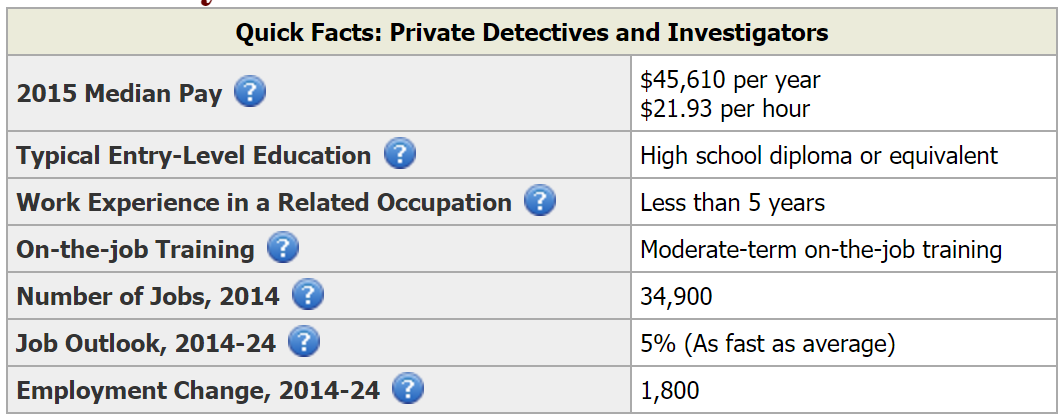

Table Of Contents
- Average Detective Salary
- Detective Career Outlook
- How To Become A Detective
- Detective Job Description
How Much Does A Detective Make
The base salary of a detective first depends on his or her employer. Usually, a state employed investigator has higher earnings compared to a private one. This is mostly due to steady work that they receive compared to the intermittent work of a private detective.The reason behind this is they always have work to do compared to a private detective. A state employed detective earns a national average of $76,000. Whereas the average salary for a private detective can be around $45,000. The factors that affect a PI’s salary will be discussed later. For now, let us look at the factors that affect the salary of state employed investigators.
[asd_program_button /]Population Size
The income of a detective depends on the population of a city the same to that of the police officers. If the city is more populated, then the number of cases that need to be handled also rises. Therefore, the salary increases as well. One of the major factors in deciding the salary of an investigator is the crime rate. For instance, someone in the LA police department will get an average salary of $44,000 to $88,000. In contrast, for someone in Miami Police department, the average salary tends to be around $86,000 to $107,000.
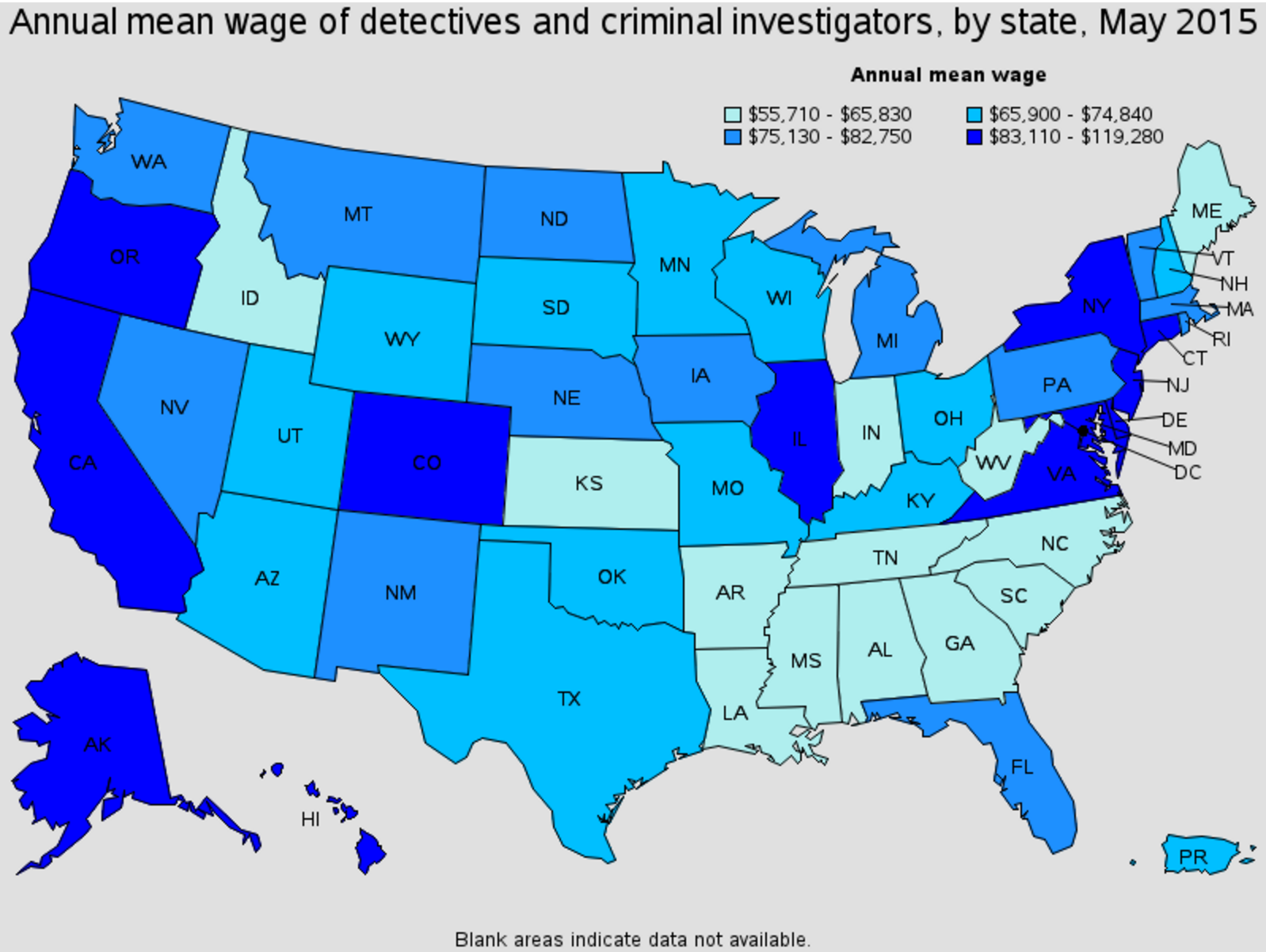
Location of job
The location is closely related to the population of the place and the crime rate. However, another factor comes into play in such conditions – cost of living. A detective will be paid higher if the cost of living in that certain location is higher. Private investigators will also have this case. District of Columbia, Alaska, and New Jersey all pay 6-figure salaries with District of Columbia paying as much as $116,000.
Education background
One can have a police job if he or she has a high school degree except at the federal level. This rules do not apply in all states but higher education certificates are not required in most states. But, the importance of higher education is considered by some states and departments that is why a degree after high school is a factor that affects the salary of the officers and detectives. The degree could be associate, bachelor or master’s. You will be paid more depending on your degree.
Experience
Like any other job, you will get earn as an investigator if you stay in the field long enough. For those who are working in the field for 20 years already even if they are not promoted will get up to $15,000 increase. You can earn about $180,000 annually if you reach the post of Police Chief as a promotion.
Cudahy Private Investigators
The salary of a private investigator depends on the how many cases he or she takes and solves them. The factors that affect the salary as mentioned above include the location, amount of discretion needed, amount of danger involved, required extra equipment and other many things. Clients usually present their problem to the investigator and then it is up to them to quote a price for the job.
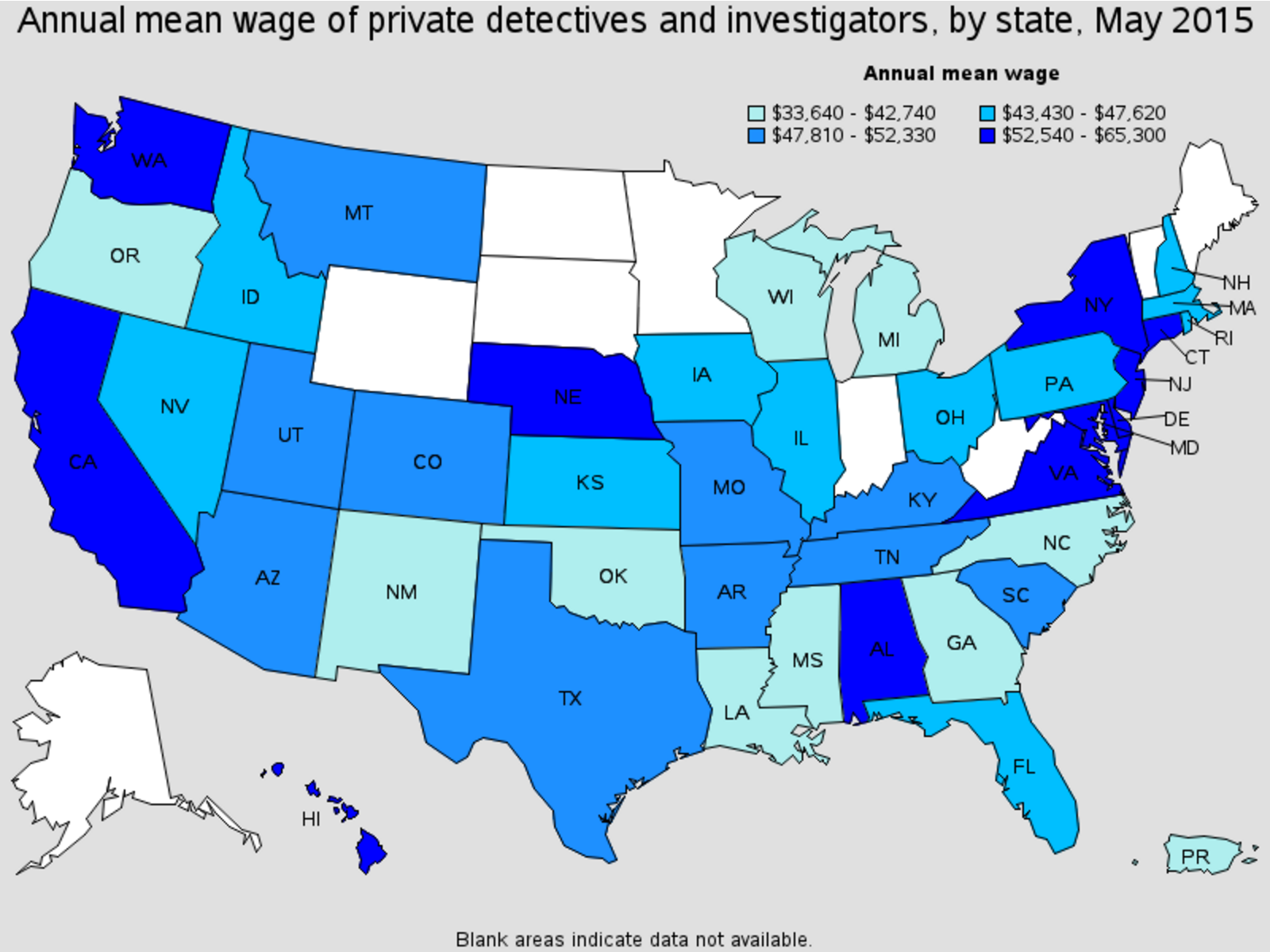
As you can see, the income of a state-employed detective is steady and can be increased by various means. On the hand, the salary of a private investigator is quite unpredictable and can only be increased by fame (or rather being more discrete). Now that you have the financial facts, you can decide which path to choose.
Cudahy Detective Career Outlook
What we are going to talk about first is the growth in the fields. In 2015, the recorded public detectives or criminals investigators are about 106,000. There were about 30,000 private investigators who do the same job on record. In this industry, the predicted growth of private detectives is about 15%. This goes to show that by 2025, 1,500 new jobs will be opened. This is the same growth rate of 5% in different sectors. On the other hand, for public investigators, this figure is at 4%. Meaning to say, in 2025 it is expected that there will be 4,000 more jobs as a criminal investigator. This too is an average rate of growth.
[asd_program_button /]The increasing population is the reason behind this steady increase in employment. As the population increases, more people need to be protected and more criminals need to be caught. But due to the strict implementation of laws and technology are more advanced, the crime rate is not increasing that much. Hence, there is a balance in each other, which leads to average growth in both careers.
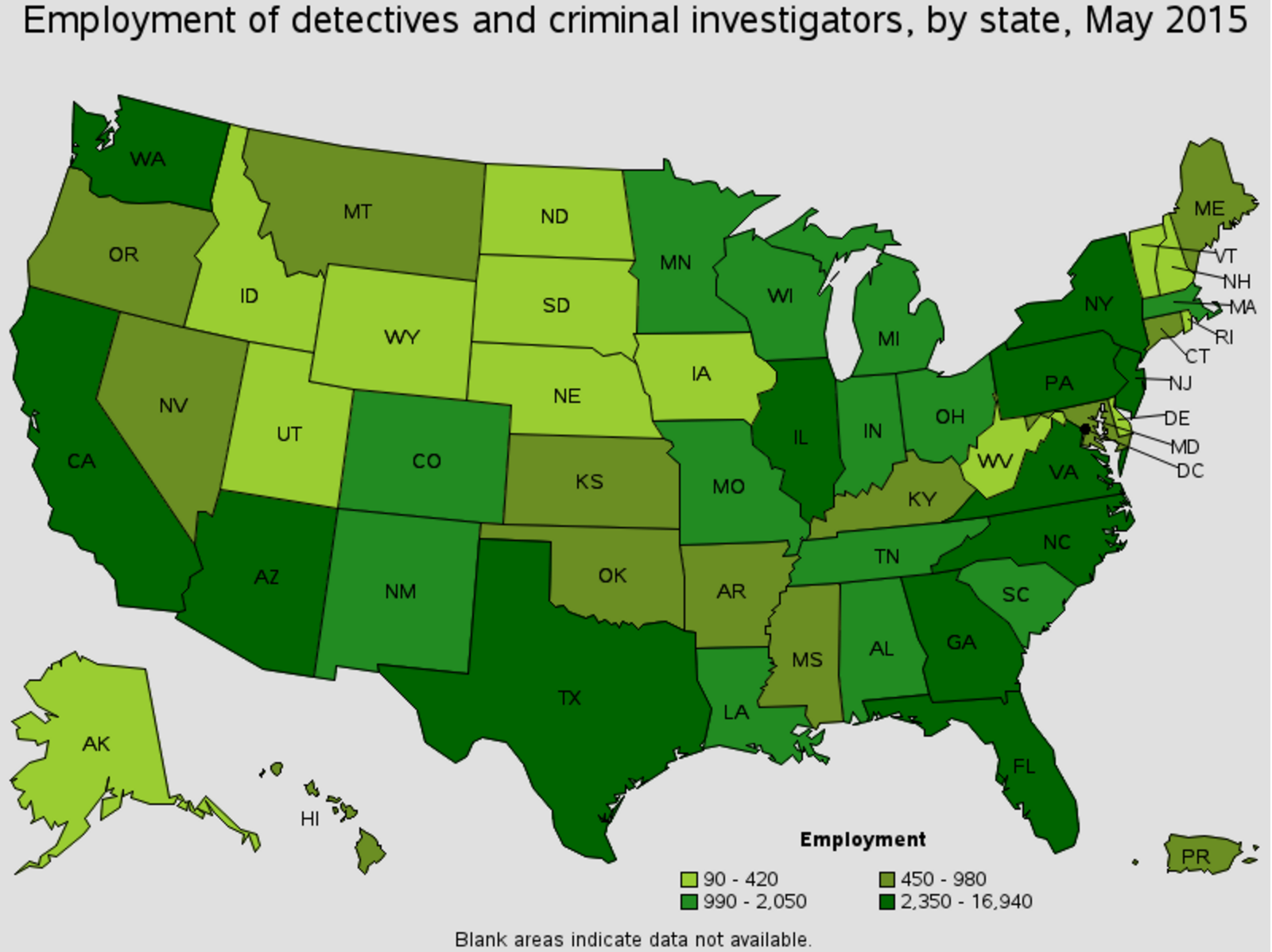
In terms of location, Texas, California and New York have the highest number of Criminal/Law Enforcement Investigators. There are more employments in Western states and Texas compared to the eastern part. Private detectives are prominent in California, Texas and Florida with the southern states tending to employ more compared to the northern ones.
Let’s see what are the industries that hire these professionals most. Criminalinvestigaors are being hired mostly by The Local, State government and the Federal branch. Whereas private detectives are being hired by Security Services, Consulting services and the local government for consultation purposes on a few cases.
When it comes to finance, criminal investigators are paid more compared to the private ones. Their annual average salary is $80,000 (Criminal investigators) and that of Private investigators is around $52,000. Public investigators are paid most in District of Columbia, Alaska, and New Jersey in the aspects of geography and finance. Private detectives were paid most in Alabama, Nebraska, and New Jersey.
Comparing with different industries again, we see that for private industries, the most employing industries do not pay the highest. Private detectives are paid most in Electromedical, Navigational, Power generation, Metal Product forming and other such industries because of the most sensitive information that needs to be protected. Moving on to Public Investigators, federal agencies, postal services, and educational institutes pay the most.
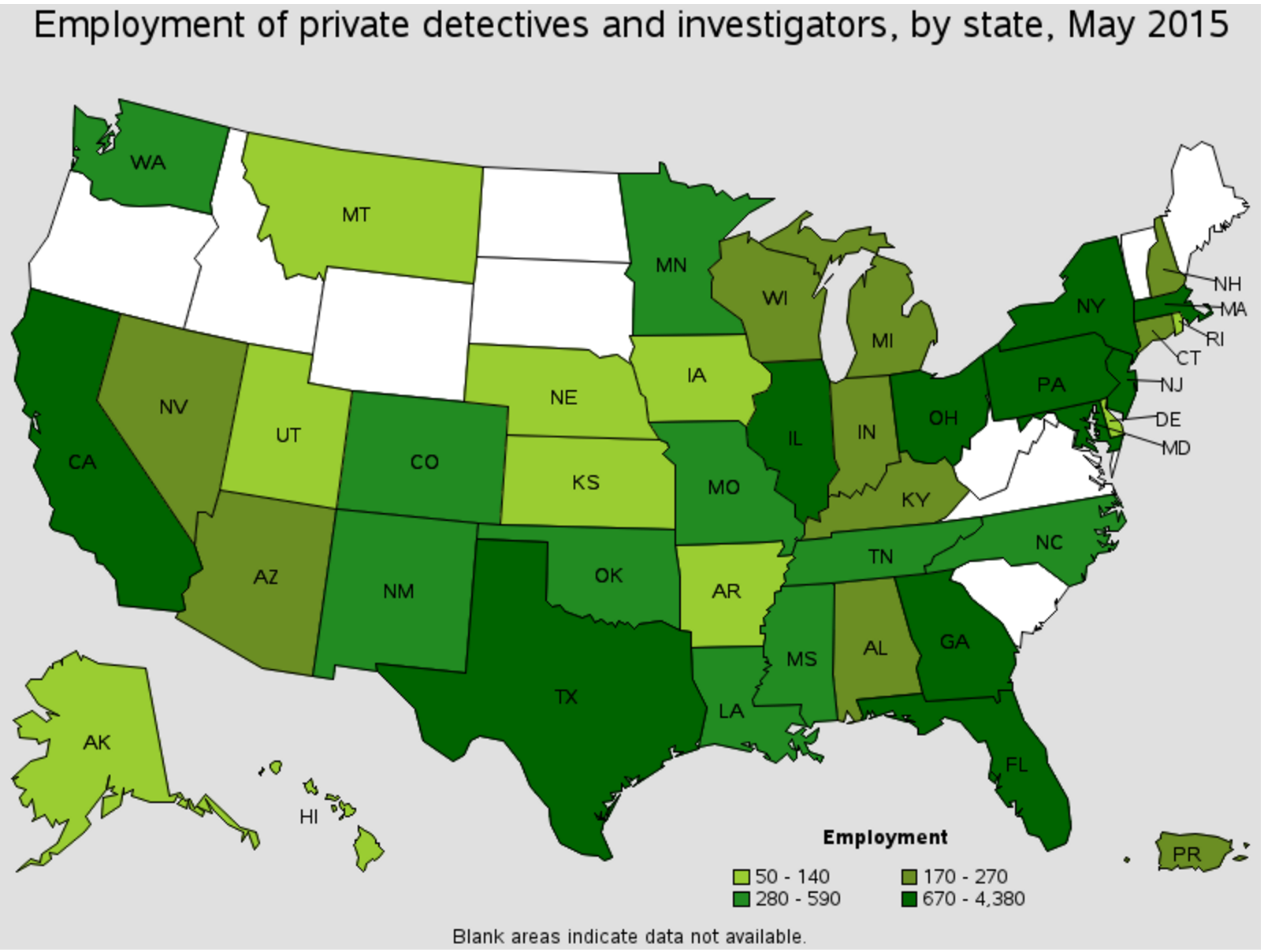
Qualifications to Become a Cudahy Detective
Detectives come in two kinds. There are private investigators that the general public can hire to investigate on certain things. Some of them are employed by the government and get this post after their promotion as a police officer. We will explore both avenues here.
[asd_program_button /]Complete High School
Due to excellent deduction skills, a deductive is able to take a leap from a police officer to a detective position. Thus, a general way in becoming a detective is to first complete high school and get into the police academy to become a police officer. To become a private investigator, a high school degree is a must too.
Earn a Bachelor’s degree
Usually, you don’t require a bachelor’s degree to get into the police academy. Some officers however want to have another source of income right after they retire from their job. Likewise, you will need a bachelor degree if you want to become a detective.
Many institutions require applicants to have a bachelor’s degree in law, criminal justice or psychology to become a detective. A total of 5000 hours of training is given to anyone with an associate’s degree. But for someone with a bachelor’s degree, the required training is only 4000 hours.
Gain experience
You need to experience working as an investigator first before you can become a professional detective. There are many ways to get this. But in most cases, it will require you to be employed by the government. You will be regarded as a person with experience if you worked as a criminal investigator or an arson investigator. However, you can also choose to work as a licensed repossessor or office investigator.
The experience required might vary from one state to another. Some states require you to have 3 years of experience while others require 5 years.
Get firearms permits
Investigators who don’t have a firearms permit are prohibited from carrying their guns. Some firearms require a full training course after which they are issued with the permits. So, if you are planning to become an armed investigator, you will need to go through weapons training course and then get the permit for the required weapons.
Obtain Wisconsin licensure
A licensure test is required after you have all the requirements needed. This test usually contains some multiple choice questions about state laws and some procedures that often need to be carried out. The test is only available for those who want to be private detectives. If you managed to pass, you will become a licensed private investigator.
Get Wisconsin Insurance
Being a detective is dangerous, hence it is a good idea to get your insurance. Typically, we’re talking about a $10,000 medical insurance. But since you’re carrying a gun with you for extra protection, and you will have to insure the gun as well, getting a higher amount will be an ideal choice.
Complete all these steps and then voila! You can finally fulfill your dream and become a detective! However, don’t forget that being a detective would mean exposing yourself to danger. If you want to pursue your dreams, learn all about the requirements and complete them as soon as you can.
What Does A Detective Do In Cudahy?
Crime Scene Investigation
One of the main duties of a detective is to analyze a crime scene and deduce certain assumptions from it. The detectives find and bag evidence at the scene of the crime. They are supposed to take anything into custody that may look suspicious and may be used for clues or in the court later. To help them deduce a lot of things more quickly and easily, the forensic department will sometimes offer them assistance. Detectives should gather as many clues and evidences as possible by analyzing cameras and gathering information from eye witnesses.
[asd_program_button /]Criminal Research
Doing research regarding previous cases is regarded as an important aspect of a detective’s job. Through this, they can get to the mind of a criminal and discover any hidden clues and patterns. This involves looking into previous case records to allow them to have an insight regarding the behavior of the criminal. In cases of serial killers or ‘copycats’, research helps a lot. This is also applicable when it comes to knowing what tactics a drug cartel is up to. Research also helps detectives make deductions more efficiently.
Narrowing down suspects
The whole objective of everything that a detective does is to serve justice to the person who has committed the crime. But to do this, they first need to a list of possible suspects. This suspect pool maybe as big as 100 people or as small as none. They create this suspect list by drawing conclusions from the evidence gathered at the crime, eyewitnesses, research and a bit of criminal/forensic psychology. The list will then be narrowed down by interrogating suspects one after another. With a narrowed down list, they will then have the suspects admit to their crimes.
Testifying In Court
As part of their final job, detectives will need to make sure justice is served. To help with the process, they are sometimes summoned to the court to testify against the suspect(s). They either narrate a possible scenario of how the crime was committed, describe how the evidence incriminates the suspect or provide their expert views on certain topics. There are also cases where the one at fault will be escorted by the detective.
Cudahy Private Detectives
All the above duties were that of a public detective or a law enforcement detective. A private detective’s job description is a bit loose. Supposedly, detectives should meet their client’s needs regardless of how difficult it might seem, especially in terms of research. But there are limits which they shouldn’t go beyond when carrying out their duties. Private detectives are often hired for tasks such as gathering evidence from someone, monitoring certain individuals, or even tracking finances. They should never act in a way that they can be easily recognized as a detective in public. Detectives are also prohibited from arresting an individual.
You see, the “Idiot Box However, the roles and responsibilities that detectives carry aren’t as easy as they seem. Such things aren’t even shown on the TV. They are always supposed to look over their shoulder and ensure they do not miss any single clue since lives literally depend on them. If you’re really interested with the job, you should start knowing what it takes to be a detective now!
